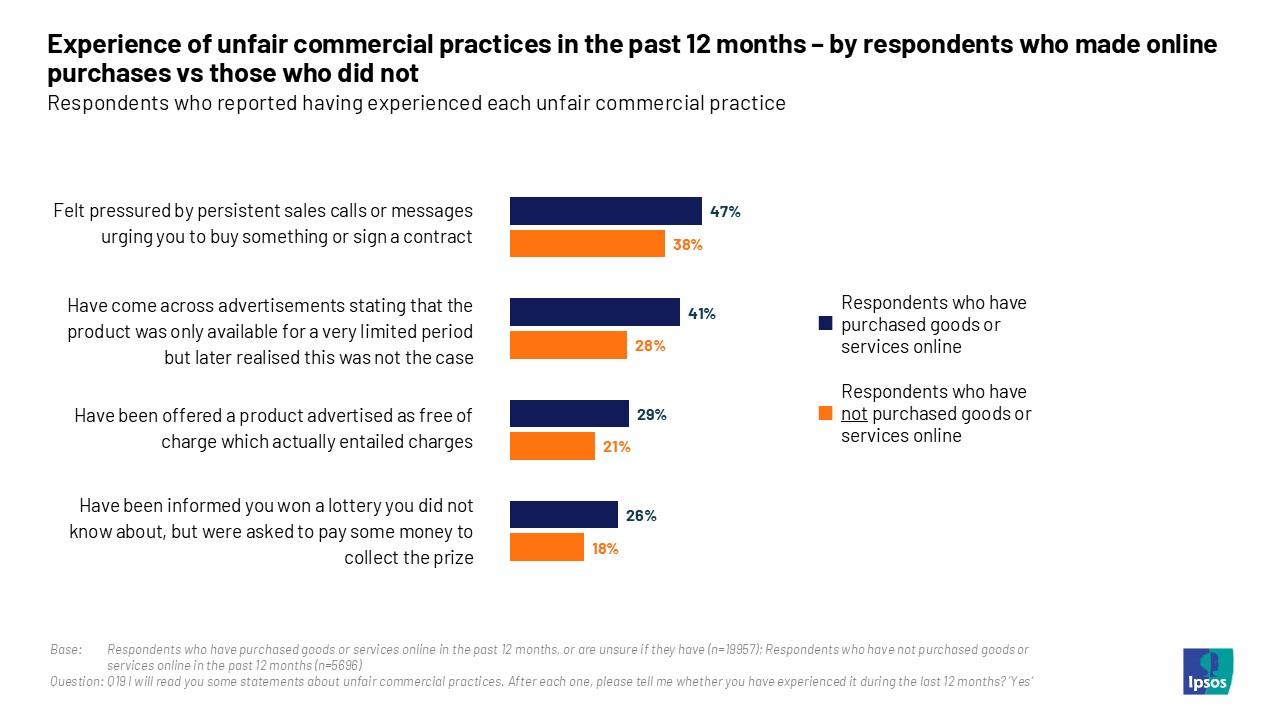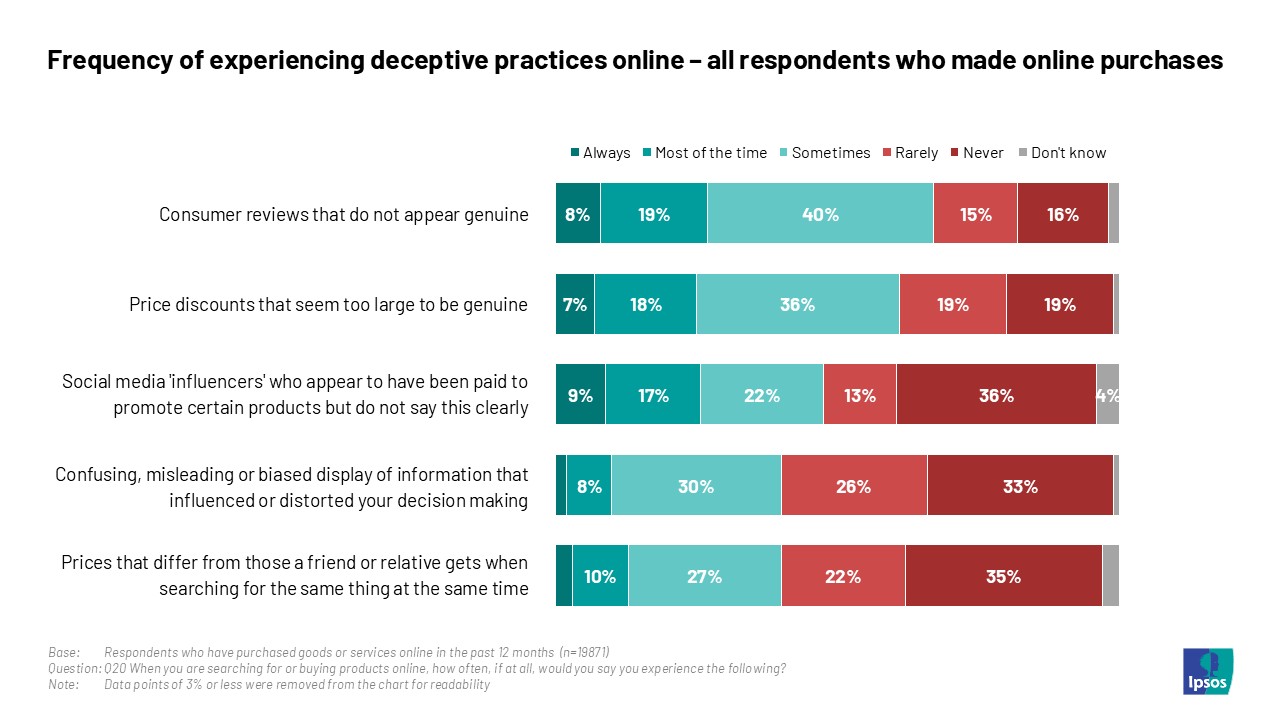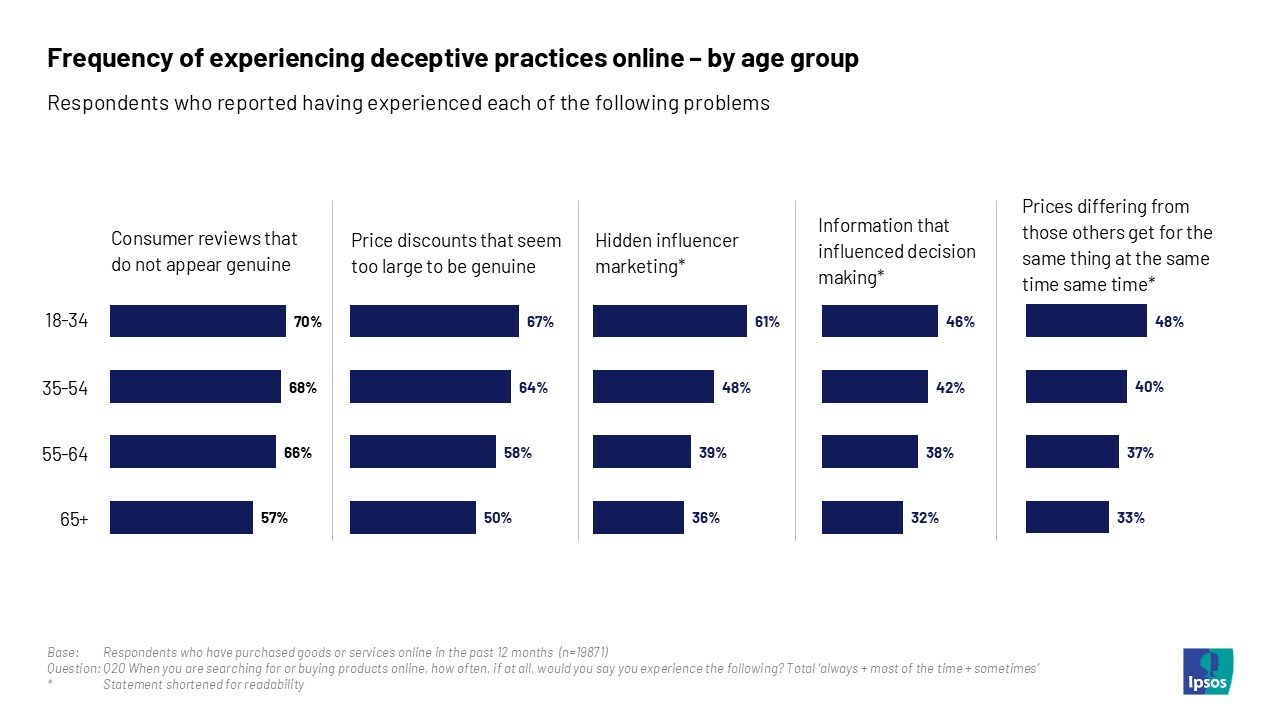The Digital Fairness Act: Battling the digital Wild West
Last week marked the closure of the European Commission’s consultation on the forthcoming Digital Fairness Act, which aims to “tackle unethical techniques and commercial practices related to dark patterns, marketing by social media influencers, the addictive design of digital products and online profiling, especially when consumer vulnerabilities are exploited for commercial purposes” 1. The Act will place particular emphasis on the protection of young people, who are seen as an especially vulnerable consumer segment due to their “specific consumption patterns” 2 and tendency to be at the forefront of new technologies and digital products.
The 2024 Consumer Conditions Survey3, carried out by Ipsos on behalf of the Directorate-General for Justice and Consumers, provides clear evidence on why the Act is needed, confirming the persistence of harmful and unfair commercial practices across the European Union’s (EU) digital markets.
Digital commerce expansion without adequate safeguards
According to the survey, just over three-quarters of EU consumers (76%) purchased goods or services online in 2024, marking a five-percentage-point increase from 2022. While this growth trajectory established the digital marketplace as the dominant commercial environment for European consumers, protection mechanisms appear not to have evolved to the same degree.
The survey documented systematic exposure to manipulative tactics across the EU: Almost half of online shoppers (47%) had experienced persistent sales pressure in the last 12 months, 41% had encountered false scarcity claims, 29% had been offered ‘free’ products containing hidden charges, and 26% had received fake lottery notifications requiring payment.

Persistence of digital deception
Deceptive practices appear to constitute a routine feature of online shopping experiences, rather than isolated incidents. Significant proportions of the consumers surveyed reported regular exposure to various such practices:For example, 66% had often encountered consumer reviews that did not appear genuine; 61% had come across price discounts that seemed too large to be true; and 47% had come across influencers who appeared paid to promote products without clear disclosure.

A disproportionate impact on youth
Young Europeans (aged 18-34) reported greater exposure to deceptive practices than their elders. While this difference was most pronounced in relation to hidden influencer marketing (experienced by 61% of 18-34 year olds compared to 36% of those aged 65+), there was over a ten-percentage-point difference for all of the other deceptive practices measured too.

High levels of privacy anxiety
Alongside experience of deceptive practices, a large majority of EU online shoppers expressed concern about the collection of their personal data without their consent or awareness (71%), and 58% struggled with managing or refusing cookies used to track their activities. Half of EU consumers (50%) feared that personalised advertising limited their choices and access to special offers, while 49% were concerned about being forced to pay subscriptions if they refused the monitoring and analysis of their online activity.
Only 6% of digital consumers reported having no concerns about these practices. This near-universal apprehension, with 93% in total expressing at least one privacy concern, represents more than anxiety – it signals a fundamental breakdown in the trust relationship between consumers and digital platforms. Trust, once broken, can prove difficult to restore through market mechanisms alone.
It is time to stop treating digital distrust as the norm
The forthcoming Digital Fairness Act represents a necessary evolution in consumer protection by responding to documented harms with targeted legislative provisions. Alongside insights from the consultation on the Act, findings such as those set out above offer both a mandate and a blueprint. The data reveals not just where intervention is needed, but where it is most urgent. For Europe's digital consumers, and particularly its young people, the Digital Fairness Act represents a critical test: Can regulation restore trust in markets where technology has outpaced protection? The evidence suggests it must.
Restoring Trust in the Digital Marketplace
By Christine Tresignie
The data tells a clear story: Europe’s consumers have embraced the digital world, but they no longer trust it. The Digital Fairness Act is more than a legislative initiative, it is a test of whether the European Commission can turn that erosion of trust into an opportunity for renewal.
For policymakers, this is not just about enforcement. It is about rebalancing the digital relationship between citizens and the platforms they depend on every day. People want innovation, but they also want fairness, transparency and control over their choices. The Act’s success will depend on how well it can deliver all three.
What the findings show is that distrust is not apathy, it is engagement waiting for reassurance. Consumers are paying attention. They want to see the EU act where national frameworks have struggled: protecting young people, addressing manipulation, and restoring a sense of integrity to online markets.
If the Commission can meet that demand, it has the chance to do more than regulate, it can rebuild public confidence in Europe’s digital future. Because fairness, once visible and enforced, is not just good for consumers. It’s good for democracy.

![[WEBINAR] Taste of the Future](/sites/default/files/styles/list_item_image/public/ct/event/2025-06/Food%20Event_webinar_v0.1_0.png?itok=iUbrFQ9Q)
![[EVENT] Taste of the Future](/sites/default/files/styles/list_item_image/public/ct/event/2025-04/Taste%20of%20the%20Future_website_v0.2.png?itok=3YDqzvum)
![[Webinar] KEYS – Brand Talk LIVE](/sites/default/files/styles/list_item_image/public/ct/event/2025-02/vignette.png?itok=damYDHdW)